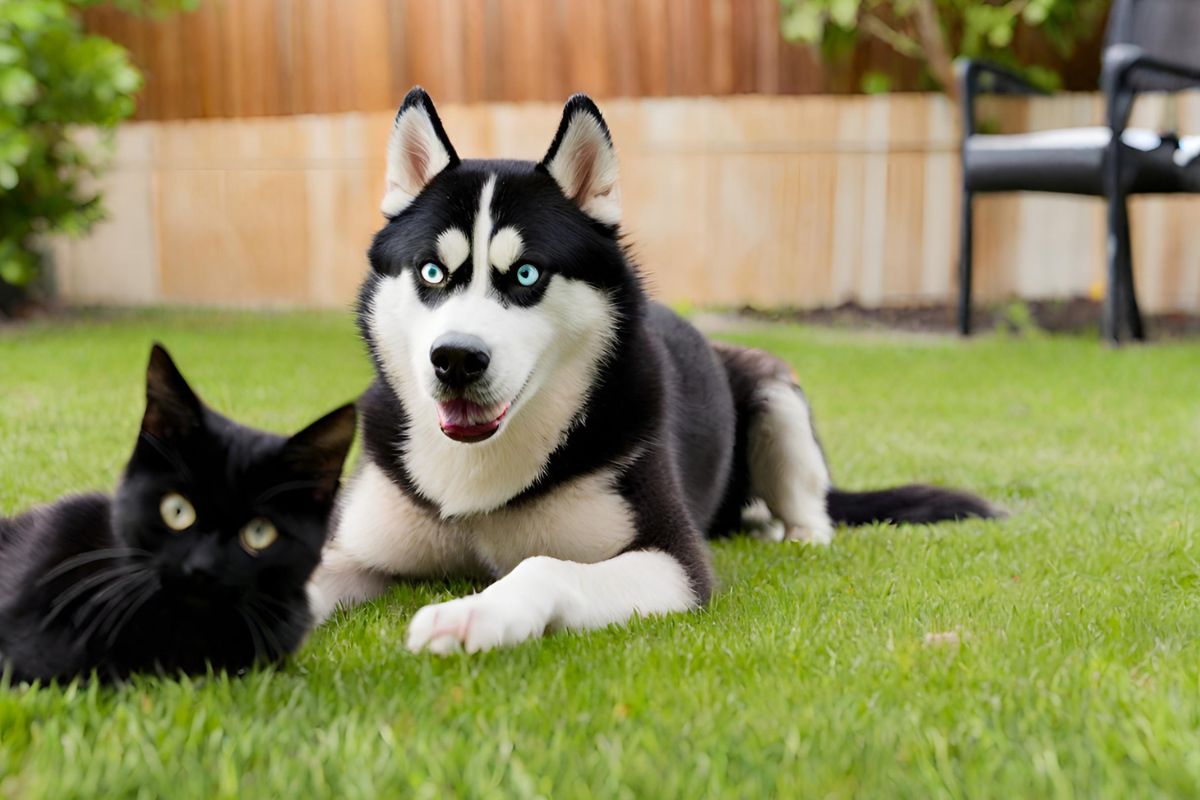Are Huskies good with cats? Everyone wants to bring a Husky into their household. These dogs are breathtaking animals with fun-loving and energetic personalities. So it’s no wonder why so many people want to add them to their families.
But some families already have a cat living inside their homes. It brings up a common question in the dog owner community: Are huskies good with cats? In this article, I tackle this topic and several related ones to ensure any cat household considering adding a Husky knows what to expect.

Are Huskies Good With Cats?
Siberian Huskies don’t have stellar reputations for getting along with cats. It often results in owners getting rid of the dog or cat to relieve the issues. Overall, having a Husky live with cats is a situation to avoid unless completely necessary or properly managed.
But it does make you question why cats are lousy companions for Huskies. It comes from four Husky characteristics: a high prey drive, powerful bite force, overall size, and strong/independent personalities.
1. High Prey Drive
The primary issue with raising Huskies around cats is their high prey drive. In other words, these dogs are used to hunting and eating smaller animals. It’s an intuitive part of their DNA, making this relationship a little tenuous.
After all, cats are much smaller animals than Huskies. So it becomes almost second nature for them to chase down and hunt them. If an owner wants to recall this behavior, they must work diligently and be patient with their Husky.
It’s another reason why Huskies aren’t a smart choice for first-time owners. These dogs require significant time and effort to adjust to a household. I’ve seen it become overwhelming for even experienced owners who don’t have time to meet their high-energy needs.
2. Powerful Bite Force
Huskies aren’t known for being overly careful when biting into objects. Instead, these dogs have a powerful bite force that can cause problems even if not done purposely. These situations could result in a cat becoming hurt or dying.
But I should mention that this powerful bite isn’t from them being overly aggressive. These dogs often have too much energy, which causes them to misunderstand their strength. So it causes them to put too much force behind the bite even when playing.
As a result, it doesn’t make them an ideal partner for a small animal. Cats don’t have the defense mechanisms or tough skin to deal with a powerful Husky bite.
3. Size
Huskies are a medium to large breed within the dog community. Most adults can reach up to 60 pounds while being around 22-24 inches tail. In comparison, cats don’t even come close to matching the size of these dogs.
It’s an unfair fight that isn’t helped by a Husky’s prey drive and bite force. Cats won’t have a chance if a Husky sees them as a threat. Therefore, owners must be sure they have complete control over their Husky before bringing a cat into their home (more on this later).
4. Strong and Independent Personalities
Huskies are one of the more stubborn and independent breeds. It makes training and controlling their behavior difficult for owners. Furthermore, these personalities ensure they make quick decisions rather than waiting on their owners.
So if huskies get set in their ways, it’s challenging to train them. Therefore, introducing cats to an adult Husky without any previous cat experience is a recipe for disaster. They won’t see the little furry ball as anything other than prey.

How to Introduce Your Husky To Your Cat?
I’ve been pretty doom and gloom about Huskies living with cats. But these two pets can live in harmony. Owners will simply have to be extra cautious and follow some steps to ensure a safe introduction:
Before I start, I must acknowledge this introduction process is mostly for Husky puppies. It’s uncommon that an adult Husky will adapt their ways to accommodate another small pet. You can try it out, but it often won’t be in the cards.
1. Get Rid of Your Husky’s Extra Energy
Allowing a Husky to encounter your cat without exhausting their energy level isn’t a good idea. If they go into this interaction with pent-up energy, it’ll be disastrous. It’ll probably end with you running around the house to stop them from chasing the cat.
Given this information, I’d recommend providing plenty of physical and mental stimulation before this meeting. It could be a long walk around the neighborhood or a tiring game of fetch.
2. Let Both Sides Smell Each Other Before Meeting
Both cats and dogs have a strong sense of smell. Owners can help engineer a more successful interaction if they allow each side to get a whiff of each other before meeting. An easy way to accomplish this is by having a closed door between them.
It should be a solid door without a way to see through the other side. But your Husky and cat will get an idea of what’s on the other side. Doing so will help tone down their excitement and prevent either animal from being surprised.
3. Use a Crate to Your Advantage
Having your Husky meet the cat without being confined is a horrible idea. So I’d suggest putting them in a crate and letting the cat feel their way around the room. It’ll offer a safe environment to develop a familiarity with each other without activating your Husky’s prey drive.
My other advice is to ensure your crate is top-tier. A rambunctious Husky can rip through a subpar model without much issue. So do your research and find one capable of holding up against them.
4. Reward Your Husky’s Positive Behavior
Relying on positive reinforcement should be your next step. Reward your Husky anytime there’s a non-problematic interaction with the cat. So if they don’t grow or snap, give them a treat or other reward (pets, attention, toys, etc.).

5. Don’t Allow Long Periods of Interaction
Early interactions shouldn’t be more than five minutes. Of course, these situations should be surprised by you or a trusted adult. I also wouldn’t trust your Husky to contain themselves, so keep them on a leash.
Again, keep up the reward-based system to ensure positive results. It’ll show your Husky that having this small animal in their life is a positive. Don’t be afraid to pull the rip cord if any aggression or stress shows in either animal during this interaction.
6. Keep Practicing and Extending Interaction Periods
You’ll want to keep pushing the length of these interactions. But work in intervals rather than jumping straight to 30 minutes. Therefore, start by going from 5 to 10 minutes and see how it goes while offering constant positive reinforcement.
Continue increasing the length until you reach the 30-minute mark. Once you feel comfortable they won’t attack, take your Husky off-leash and supervise closely. Any signs of aggression should be dealt with firmly by a stern “stop” command.
I’d also create an escape avenue for your cat. My favorite are tall cat trees, which your dog won’t have any way to access.
7. Continue the Process Until Both Sides Feel Comfortable
This process can take several months to take effect where there aren’t any scuffles. So be patient and display positivity during the experience. But remember, some Huskies simply won’t be suitable to live comfortably with a cat companion.
5 Keys to Developing a Healthy Husky and Cat Relationship
Keeping a Husky and cat safe doesn’t stop with the introduction. Owners must do various things to keep them happy with their arrangements. So here are a few keys to ensuring harmonious living in a cat and Husky household.
1. Start the Acclimation Process ASAP
As I mentioned earlier, it’s harder to make an adult adjust their ways than a puppy. These older dogs are more set in their ways, especially with a Husky’s reputation for stubbornness. That’s why experts often suggest starting their training as soon as possible.
Getting them acclimated with a cat is no different. A younger puppy is more controllable and adaptable to new experiences like meeting a cat. They’ll still have an adjustment period, but the process of growing up with them will help mitigate any severe issues.
On the other hand, your cat will be much more comfortable with a puppy. It won’t be as fearful or defensive, which will help ensure a natural progression during this process. Hopefully, the cat will become overly comfortable with the Husky before adulthood.
But I’d still be weary of keeping them together at all times. It’s best to separate them for periods to allow each some privacy. If not, a stressed-out Husky may become agitated and act out against your cat.
2. Train Your Husky to Adjust Their Playing Habits
Huskies are aggressive with their playing habits. They often roughhouse more than kittens or adult cats can handle without injury. So you’ll need to teach them playing techniques that aren’t as rough.
You can ingrain these more cat-friendly habits with positive reinforcement. So if your Husky softly plays with a cat, proceed to give them a treat. But if your husky gets a little too aggressive, separate them to ingrain it as a destructive behavior.
If you’re a visual person, here’s an excellent video showcasing how to train a hyperactive dog to be more calm around their feline friends. It’ll provide a good idea of where you can start.
3. Share the Love
Owners must make an effort to share their love with both animals. It may seem obvious, but it’s much easier to bond with dogs than cats. For instance, dogs are constantly trying to get our attention, while felines are more independent.
But it doesn’t mean cats don’t want your attention. So remember to share the love between both animals to ensure jealousy doesn’t fester. If it does, you could soon have territorial issues inside your household that can result in fighting.
4. Don’t Feed Them Together
One of the easiest ways to keep peace is separately feeding each pet. Both animals often have a possessiveness over their food, especially dogs, which can cause riffs to happen. So I’d designate different areas/times to feed your Husky and cat separately.
Most people find it beneficial to feed the older animal first, whether it’s your cat or Husky. It’ll prevent any jealous feelings while avoiding any pecking order issues.
5. Set Up Various Escape Routes for Your Cat
Cats will need ways to escape Huskies if an altercation does happen. Most owners find cat trees to be an obvious choice, while boxes or tables are also helpful. Basically, any structure a dog can’t reach or climb to corner your cat will work.
You can even create your own structures to help them if you’re into DIY projects. I’d only suggest being overly cautious about the sturdiness. The last thing a pet owner wants is a dog tipping over a pet tree or tower to attack their kitty.
Conclusion
Generally, Huskies aren’t good companions for cats. Their high-prey drive, power bite force, overall size, and independent personalities make them a tricky fit. But some people do have success with puppy Huskies and cats.
Puppies are simply more amendable to having a cat in their lives. So if you decide to get a Husky companion for your cat or vice versa, adopt/buy a puppy. The necessary training and management becomes much easier.
If you have any other concerns or questions, leave a post below. I’ll answer each one as soon as possible. Thanks for reading!


